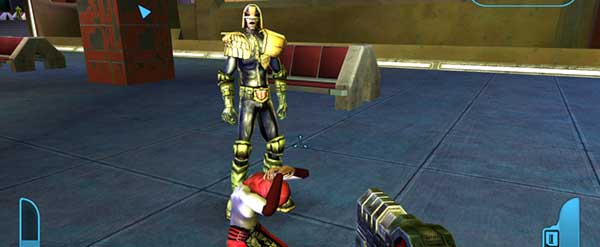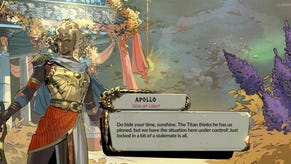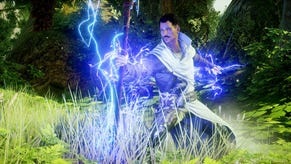Retro: Dredd Versus Death
I recently found myself rereading a whole load of Judge Dredd strips I’d eagerly devoured as a violence-crazed teenager. I’d not questioned the politics or attitudes of them at that age – I’d just cheered when Dredd killed a guy. Coming to it now is fascinating, trying to spot the dividing line between satire and the disturbing inherent implication that a police state is a-ok so long as the police are moral and honest actionmen. Of course, it also made me want to go shoot some perps.
While we’ve got a number of games that are Dredd-esque in their approach – Syndicate, Crackdown and even Half-Life 2 as a sort of you-versus-the-Judges setup – what we don’t have much of is yer actual Dredd games. The most notable is Brit studio (and 2000AD owners) Rebellion’s 2003 FPS Dredd vs Death. This was a game I was ludicrously excited about pre-release, Rebellion being responsible for one of my all-time favourite shooters, Aliens vs Predator. Given a license and a world as rich as Dredd’s, surely this could only be a triumph? Famously, it wasn’t.
In its wake, Rebellion’s star dimmed dramatically. They might have later proven they still knew what they were doing with the Sniper Elite and Rogue Trooper (another one of my list for future retro pieces), but other than that it’s been a parade of mediocre-to-terrible PSP and PS2 games since. They even tarnished their own finest hour with a diabolical Aliens vs Predator title for the Sony handheld. Most recently, a messy sequel to Vietnam FPS Shellshock impressed precisely no one. (Despite all this, they’re reportedly one of the most profitable developers in the country – a depressingly inevitable side-effect of almost everything they’ve made in the last half-decade being attached to a movie license). Was it all Dredd’s fault? There’s a fascinating story to be told, I imagine.
There’s also a fascinating story to be told in terms of how Dredd vs Death ended up being quite such a failure, given the pedigree and enthusiasm behind it. Going back to it now (it rather surprisingly having just shown up on Steam. I shed a single crystal tear every time humdrum fare like this makes Steam, but diamonds in the rough like King’s Bounty or Men at War don’t), it’s really not the disaster legend paints at is.
Now I’m away from the initial gutpunch of disappointment, entirely separate from the hype of two years’ promising-the-earth previews, it’s a lot more obvious what Dredd vs Death was trying to do, even if it clearly didn't achieve it. There are hints it was headed down a far more interesting path, before some hammer of engine limitations, deadlines or commercial worries fell on it and turned it into the run of the mill zombie shooter it turned out as.
Arguably, there’s something more important to a Judge Dredd tale than Dredd himself. It’s Mega-City One, the seedy, overpopulated future metropolis he watches over: the vast bulk of America’s East Coast consolidated into one impossibly large urban sprawl. For a Dredd game to work, Mega City One needs to be realised: too many people to realistically govern, the endemic crime’n’grime that results, and the brutal police state that tries to control it.
In its first moments, Dredd vs Death seems to get it: Dredd emerges into a landscape of towering megascrapers and garish advertising, to face a horde of democratic protestors. Judges out! Judges out! But this is a city far past democracy. These are not a political voice here – they’re troublemakers. Criminals. The option to arrest or kill perps is introduced, and it seems as though this is what the game will be about – Dredd doling out the on-the-spot sentences his rank and title allows him to. Shortly, he’s gunning down graffiti artists to terrify others into giving themselves up. The death sentence for spray paint: that's the way Mega-City One works. There's a challenge system, remisicent of the excellent SWAT IV, with which you can demand perps give themselves up. If they don't, you've got carte blanche to gun 'em down. Simply gun 'em down on sight, though, and you'll end up with the law on your back. It takes a fair whack of random slayings to get yourself in this much trouble, but it's enough to ensure you do roleplay Dredd as cop, not out-and-out psycho.
It feels like it’s about to become a free-form game of instance justice – GTA through an even darker mirror. Sure the population is weirdly sparse and the character models repeat and repeat, but there’s something in the way the giant buildings loom oppressively, the civilians’ out-and-out resentment towards Dredd, the absurd violence or charges he can dole out to anyone on a whim, the way the adverts are so desperate they’re incoherent (including the paid-for Redbull ads), the functionality of the architecture... It even looks great, even if it was technologically dated even at the time – it’s exaggerated and colourful, values than seem forgotten in today’s muted grey’n’brown FPS landscape.
And then the vampires arrive. Ten minutes in, and all that good work’s immediately undone by a crazy decision to introduce swarms of generic undead monsters. The city design and the potential-packed sentencing system is immediately rendered irrelevant in the face of an archaic shooting gallery, and that's the cheerless path the rest of the game stumbles down until its end, a mere five or six hours later. It’s all Judge Death’s fault - in many ways.
Obviously, the kill-crazed alien zombie is behind the story’s undead plague, but his inclusion in the game at all is part of its downfall. Even in the comics, he was an out-and-out fantastical character in a universe that was largely based on scientific/social theoretical possibility. Making him this game’s key foe practically guarantees it’d become a monster-shooter. Had this been simply “Judge Dredd” it’d have been a very different game. God only knows what pressures Rebellion were under to deliver a shooter that'd appeal to console audiences first and foremost, and one based on a license that most potential players would associate with a terrible Sly Stallone film, but making it about zombies rather than morally ambiguous future-politicking certainly didn't help.
As it is, it still retains a great What If promise, one that’s weirdly more visible now than it was at the time. There’s the start, the hint of a great Judge Dredd game there, an inkling of understanding as to what a gift of a concept he and his Mega-City offer. Perhaps, one day, someone will make something of it. I’d truly love for it to be Rebellion, but given their recent output I'm concerned they’re just not interested in stretching themselves so anymore.














